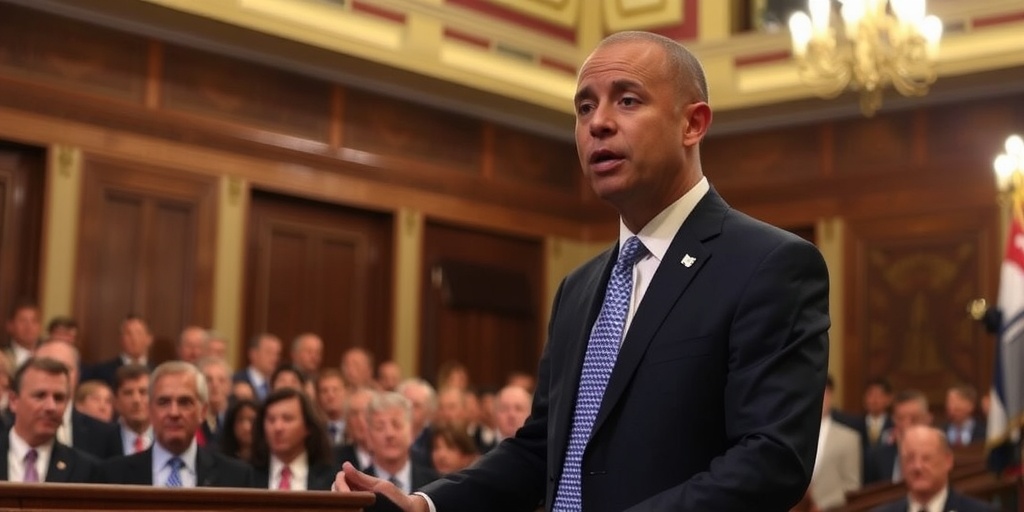Now Reading: Impact of Trump’s Tariffs on U.S. Farmers
-
01
Impact of Trump’s Tariffs on U.S. Farmers
Impact of Trump’s Tariffs on U.S. Farmers
Retaliatory Tariffs Hit U.S. Farmers, Straining Rural Economies in Trump Strongholds
In the heartland of America, where cornfields stretch as far as the eye can see, U.S. farmers are facing unprecedented challenges. The ongoing trade tensions, particularly with nations like China and Canada, have led to retaliatory tariffs that are significantly impacting the agricultural sector. Ana Swanson, a seasoned trade and international economics reporter for The New York Times, sheds light on these developments and their implications for the economy, especially in states that heavily supported President Trump in the 2016 election.
The backdrop of this situation lies in the escalating trade war initiated by the Trump administration. The imposition of tariffs on steel and aluminum imports triggered a wave of countermeasures from various countries, notably China and Canada, both key markets for U.S. agricultural exports. What began as a political maneuver has swiftly morphed into a battleground that disproportionately affects rural communities, particularly in states like Iowa, where farming is a way of life.
As retaliatory tariffs take hold, U.S. farmers are finding their livelihoods under threat. For instance, soybeans, once a reliable source of income for many American farmers, have seen prices plummet due to Chinese tariffs enacted on U.S. exports. Before the trade disputes, American farmers shipped a substantial portion of their soybean crop to China. However, with the implementation of hefty tariffs, the demand for U.S. soybeans from Chinese buyers has dwindled, leading to a significant drop in prices. According to the U.S. Department of Agriculture, soybean prices fell to their lowest levels in over a decade, leaving farmers struggling to make ends meet.
This dilemma extends beyond soybeans. Various agricultural products, including pork and dairy, have also been subject to retaliatory tariffs. Canada, a vital trading partner for U.S. agriculture, has responded with its own tariffs on American goods, further squeezing farmers in states that supported Trump. The pork industry, which relies heavily on exports, has been particularly hard-hit, leading to reduced profit margins and an uncertain future for many producers.
The consequences of these tariffs also ripple through local economies. Many rural communities in states like Iowa have long relied on agriculture as the backbone of their economy. The decline in farm incomes results in less spending at local businesses, which can lead to a broader economic downturn. Small towns that thrive on the patronage of farmers face challenges as consumers cut back on spending, affecting everything from local grocery stores to auto dealerships.
Political leaders, including some who previously supported tariffs, are now voicing concerns over the situation. Farmers, who were once staunch backers of the Trump administration, are growing disillusioned as they grapple with financial strain. The stark reality of the situation is that while tariffs may aim to protect certain industries, the repercussions for agriculture are stark and far-reaching.
In response to these crises, the federal government has announced measures to support farmers during this turbulent period. The Trump administration unveiled relief programs aimed at mitigating the impact of the tariffs. Some of these initiatives include direct payments to farmers and efforts to bolster domestic markets. However, the effectiveness of these measures remains a topic of debate among agricultural stakeholders, many of whom believe that short-term assistance will not solve the long-term issues created by the trade war.
Analysts argue that a more comprehensive approach is needed to address the complexities of international trade and agricultural economics. As farmers hope for the resolution of trade disputes, the larger question remains: How can the U.S. strengthen its agricultural sector in an increasingly interconnected global economy?
The path forward is fraught with uncertainty. As farmers navigate fluctuating markets and political decisions, the agricultural landscape is evolving. The repercussions of retaliatory tariffs serve as a stark reminder of the interconnected nature of global trade and the intricate web of relationships that define agricultural commerce.
For now, U.S. farmers are left to weather the storm, grappling with economic instability and hoping for a resolution that would restore trade relationships and stabilize their livelihoods. The impact of these retaliatory tariffs will undoubtedly resonate far beyond the fields, influencing the economy and the fabric of rural America for years to come. As we look ahead, the resilience of these farmers, coupled with effective policy responses, will be essential in shaping the future of U.S. agriculture amid ongoing trade tensions.
Stay Informed With the Latest & Most Important News
Previous Post
Next Post
-
 01New technology breakthrough has everyone talking right now
01New technology breakthrough has everyone talking right now -
 02Unbelievable life hack everyone needs to try today
02Unbelievable life hack everyone needs to try today -
 03Fascinating discovery found buried deep beneath the ocean
03Fascinating discovery found buried deep beneath the ocean -
 04Man invents genius device that solves everyday problems
04Man invents genius device that solves everyday problems -
 05Shocking discovery that changes what we know forever
05Shocking discovery that changes what we know forever -
 06Internet goes wild over celebrity’s unexpected fashion choice
06Internet goes wild over celebrity’s unexpected fashion choice -
 07Rare animal sighting stuns scientists and wildlife lovers
07Rare animal sighting stuns scientists and wildlife lovers



















